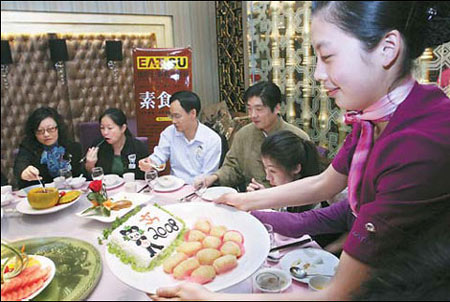
|
BIZCHINA> Olympics Economy
 |
|
Related
Up to speed
By Lu Haoting (China Daily)
Updated: 2008-08-25 17:55 From dressing its taxi drivers in uniform yellow shirts and striped ties and coaching them in basic English, from standardizing menu translations, rating restaurants according to hygiene standards to building new public "super toilets", Beijing tried to present its best possible face during the Olympic Games.
 The two-week sports gala undoubtedly served as a catalyst for the city to improve its service industry. "Because of the Olympic Games, Beijing has been pushed to speed up its development that usually would have taken at least 10 years," says Michael Pielenz, CEO of International Public Relations Academy and Consultancy, a PR training and consultancy in Beijing. "The Olympic Games are a great blessing for Beijingers. People can really feel what it is like to live in a city that offers good surroundings. This should not be just designed for the foreign guests who are gone when the Games are over. It should be for you and me who are living here," says Pielenz, who comes from Germany and has lived in Beijing for five years. His views are echoed by Russell Leu, chief representative and attorney at Taft Stettinius & Hollister LLP's Beijing representative office. "You can easily see the physical improvement in the appearance of the city, such as better subway platforms and cleaner cabs. Everybody is making a big effort. The Olympics definitely contributed a lot to that. But the important thing is to keep that because this is our place and our city." says Leu, an American who has been living in Beijing since 2004. "Foreigners could also use the Olympics as a gauge. It would be a pity when they come back to Beijing a year later and find the city is a lot different from what it was during the Olympics," Leu adds. Cabs are often the first window for foreign visitors to view Beijing when they leave airport. So the government made great efforts to improve the service of the city's over 60,000 cabs since last year. The city's municipal transport management bureau last year issued a 12-point code of conduct for taxi drivers. For example, they are not allowed to eat, sleep or smoke in the cars. If their cabs are considered to smell too much, their service will be suspended for two days. Female drivers must not wear big, chunky earrings or dye their hair odd colors like bright red or yellow. Drivers who refuse passengers, take indirect routes to run up the meters, or refuse to use the meters will be fined. The drivers were also asked to take English training classes. "I never expect the cab drivers to speak English. But looking decent, by driving clean cars and wearing clean shirts, is something you owe to your customers," Pielenz says. The catering industry is another major area the government is determined to improve. As part of the city's campaign to tackle potential food safety problems, the Beijing Health Bureau has developed an online database so that diners can check the hygiene standards of Beijing restaurants that are graded from A (excellent) to D (not qualified). The Ministry of Health started the rating system nationwide as early as 2004 by drawing on the experiences of Japan and Singapore. Thanks to the Olympic Games, Beijing has done the most thorough ratings in the country. The restaurants are rated according to 67 specific criteria, including the health conditions of waiters and cooks, the kitchen facilities and the qualifications of the food suppliers. (For more biz stories, please visit Industries)
|